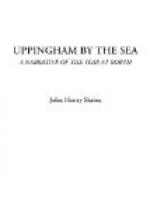The Rev. E. THRING, M.A., then rose amid cheers and said: Mr. Chairman and our friends at Borth, I have made many speeches in my life since I have been master of this school. Two-and-twenty years of school-mastering gives a good deal of exercise for the tongue from time to time; but never in my life have I stood up to make any speech which I feel so little capable of making as I do to-night; not from want of practice, but because the feelings you have aroused in us are such—and our sojourn here has been such a boon to us (cheers)—that it is impossible for me to tell you the value we set on living here, and the welcome we have received. (Applause.) I never heard anything sweeter to my ear than your singing to-night. The time it must have taken, the goodwill manifested in the songs, and altogether the circumstances under which they were delivered, and we on our last day here, made them go down into my heart, and into all our hearts with peculiar power. (Cheers.) Never in my life have I had such testimony to the school which I cared so much for, as the testimony you have given to-night. We get our reputation in the English world, but what is that compared to the inner life to which you have borne witness. What signifies it whether we know much or little in comparison with the fact that we have a character of life which you like. It is life answering unto life across all those ties, both of nationality—for I grieve I cannot speak in your native tongue—and also of distance which set gulfs between man and man, but cannot separate life when it is true. (Hear, hear.) If your life is true, and our lives are true, then it flows across and we meet as to-night one united body of living men. (Cheers.) And this is what gives a peculiar value to our being here. You know as none can know what this school is. We came among you as strangers, and you looked upon us with the eyes of strangers; we stayed among you as friends, and we part from you as friends. (Cheers.) Everybody knows that the one thing on earth which makes life pleasant is the friendly atmosphere in which men live—the one thing that makes it hateful is to be surrounded by thoroughly bitter hearts. There is an old saying that “stone walls do not a prison make, nor iron bars a cage.” No, the life within can make any place enjoyable—nay, happy. Yet, I think it is better to be in happy surroundings too. Of this, however, you may be sure: those glorious hills of yours, this sea, and all the happy hours we have spent wandering about, will not easily pass out of our minds. The jewel of a friendly spirit has also been set in very bright surroundings. We do rejoice in the life we have had here, and all that we have found. (Cheers.) You have spoken to-night of the good conduct of the school, and have said that we have caused no trouble since our stay here. That like many other questions, has two sides. Is it not a great credit to this place that when between a hundred and seventy and a hundred




